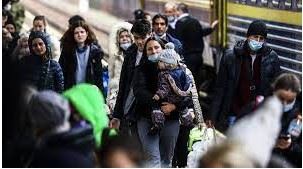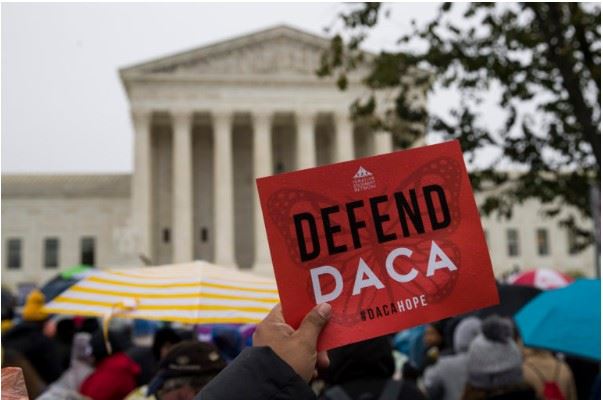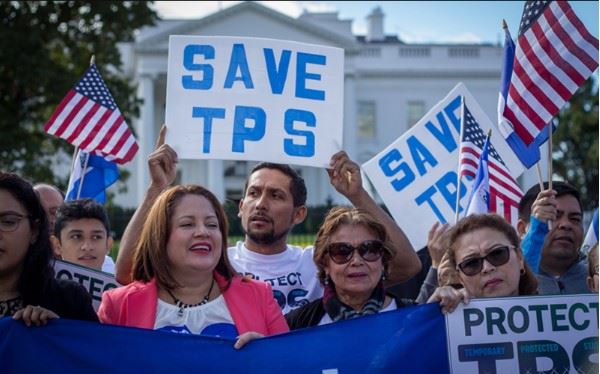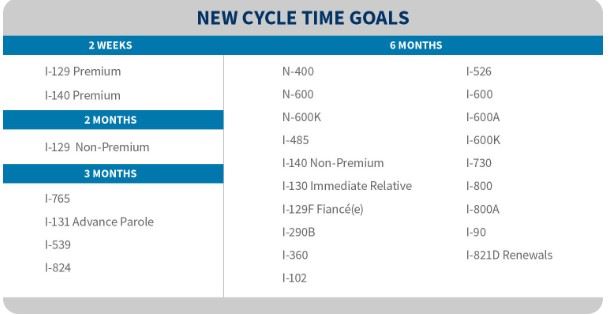Do you or someone you know have strong administrative skills? Have you ever considered pursuing a career in immigration law? If so, our firm is looking to hire a part-time (20-hour/week) stellar legal administrative assistant. Must be integritous, bilingual (English/Spanish), and able to work in our Santa Ana, CA office.

Immigrant and Refugee Processing for Ukrainians

Currently, no consular services are being provided in Ukraine. If you have a pending immigrant visa applications scheduled for processing in Kyiv, the U.S. Consulate General in Frankfurt is the designated processing post for all Ukrainian immigrant visa applications except adoption cases. All newly scheduled immigrant visa cases will be slated for appointments at the U.S. Consulate General in Frankfurt. This transfer will happen automatically. Adoption cases are being handled at U.S. Embassy in Warsaw. If you wish to request expedited processing of a pending family-based petition (meaning it has not yet been approved), please visit the USCIS website to learn how to request an expedition. Also, if you already have received an I-130 petition approval from USCIS but have not yet been scheduled for an appointment in Frankfurt, the NVC may be able to expedite the processing of your case. If you are a U.S. citizen who is physically present overseas with your immediate family members and have not yet filed an immigrant visa petition with USCIS, you may request to file an I-130 immigrant visa petition locally at the nearest U.S. embassy or consulate that processes immigrant visas. This applies only to U.S. citizens physically present in that consular district filing petitions for their spouses, unmarried children under 21, and parents who have fled Ukraine. Please email your nearest U.S. embassy or consulate’s Immigrant Visa Unit if you believe you may qualify to file an I-130 petition locally. You can find those email addresses on each embassy or consulates’ website.
Humanitarian Parole for Ukrainians, Afghans, and Others
Humanitarian Parole is a program run by the Department of Homeland Security (DHS) that allows an individual who may be inadmissible or otherwise ineligible for admission into the United States to be in the United States for a temporary period for urgent humanitarian reasons or significant public benefit. It is not meant to replace a visa process. Anyone can apply for humanitarian parole.
DACA Updates

DHS released its proposed rule for DACA in September 2021, codifying the DACA program. Comments were accepted until November 2021. Until the rule is finalized or pending litigation is resolved, USCIS is still acceptable but not processing NEW INITIAL applications. Renewals continued to be processed. Keep applying and renew early.
What happens to DACA recipients and DACA-eligible youth?
- If you have DACA right now: you are still protected and will be able to continue renewing for now.
- If you are eligible for DACA but have never applied: DHS will accept your application but will NOT be able to process it. If you do not meet the minimum requirements, such as having graduated from high school, registering to get your GED, and begin gathering documents demonstrating your entrance into The United States before the age of 16 and your physical presence in the U.S. since June 15, 2007.
- Advance Parole will remain open for DACA Recipients. This is extremely essential because advance parole under DACA counts as a legal entry which may allow you to legalize your status if you marry a U.S. Citizen or if the employer has sponsored you for a green card.
- If your application for renewal is already being processed, your renewal should continue as usual.
We need to continue to use our voices and encourage The Biden-Harris Administration to finalize the final DACA rule that will resolve matters and resolve pending litigation.
Pending Legislation
Some crucial legislation pending in Congress will create a
pathway to citizenship and protect undocumented people, including DACA recipients, TPS holders, Farmworkers, and Essential Workers. Here are just a few:
- S. 264 Dream Act of 2021 - Protects those brought to the United States as children who have lived in the U.S. for most of their lives from deportation and provides an opportunity to obtain legal status if they meet certain requirements. Introduced on February 4. 2021, by S. Durbin (D-Illinois) and Lindsey Graham (R-SC).
- H.R. 6: The Dream and Promise Act of 2021 - allows Dreamers, Temporary Protected Status (TPS) recipients, and Deferred Enforced Departure (DED) recipients to apply for permanent legal status. Introduced on 3/03/21 by Rep. Lucille Roybal-Allard (D-CA). A similar bill passed the House on 6/4/2019.
- H.R. 1177 and S.348 U.S. Citizenship Act of 2021 - Provides an earned citizenship pathway, addresses the root causes of migration, responsibly manages the southern border and reforms the immigrant visa system. Introduced on 2/28/2021 by Rep. Linda Sanchez (D-CA) in the House and by S. Mendez on 2/22/2021 in the Senate.
Temporary Protected Status (TPS) Update

Recipients of Temporary Protected Status receive protection from deportation and work authorization and may obtain travel authorization. There is litigation currently pending, which may allow TPS status to constitute a legal admission to enable those who are immediate relatives of U.S. Citizens to apply for permanent residency.
There are now 14 countries now designated with this temporary status. Here are the most recent designations:
v On March 16, 2022, DHS announced a new designation of Afghanistan
v On March 3, 2022, DHS announced a new designation of Ukraine
v On March 2, 2022, DHS announced a new designation of Sudan
v On March 8, 2021, DHS announced a new designation of Venezuela
To learn more about how to apply and registration periods, please visit:
https://www.uscis.gov/humanitarian/temporary-protected-status
DHS has automatically extended the validity of specific Employment Authorization Documents, or EADs, with a Category Code of A12 or C19, issued under Temporary Protected Status, or TPS, for Somalia through Sept. 12, 2022. United States Citizenship and Immigration Services, or USCIS, has begun sending notices to individuals regarding this update.
Employment Authorization Document (EAD) Processing Times Update
Certain applicants may apply for employment authorization so that the applicant may work in the United States while waiting for a decision on their application. The current median processing time for employment authorization cards is close to one year. Therefore, USCIS is now issuing initial and renewal EADs to adjustment applicants, asylees and refugees, noncitizens with the withholding of deportation or removal, and VAWA self-petitioners; or up to the end of the authorized deferred action or parole period to applicants in these filing categories that are valid for two years.
In addition, if you are a healthcare worker or a childcare worker
- Who has a pending Form I-765, Application for Employment Authorization,b renewal application; and
- Whose Employment Authorization Document (EAD) expires within 30 days or less, or has already expired:
You may call the USCIS Contact Center at 800-375-5283 (TTY 800-767-1833) to request expedited processing of your EAD. To determine whether you are a qualifying healthcare worker, see this DHS advisory memorandum (“Healthcare/Public Health” section, pages 7-9) (PDF).
USCIS Processing Times Update
USCIS displays case processing times for select forms and locations to let people know how long it generally takes to process their cases and when they can submit a service request for an issue that is “outside normal processing time.” Processing times show the average amount of time it takes the USCISto to adjudicate a particular form—from when it received the application until USCIS decides the case. USCIS is establishing new internal cycle time goals this month. As cycle times improve, processing times will follow, and applicants and petitioners will quickly receive decisions on their cases. USCIS will increase capacity, improve technology, and expand staffing to achieve these new goals by the end of FY 2023 (i.e., October 2024), as noted in the chart below.

In addition, the Department of Homeland Security (DHS) announced a final rule that aligns premium processing regulations with the Emergency Stopgap USCIS Stabilization Act. This final rule expands the categories of forms eligible for premium processing services, including Form I-539, Application to Extend/Change Nonimmigrant Status; Form I-765, Application for Employment Authorization; and additional classifications under Form I-140.
I-601A Provisional Unlawful Presence Waiver Processing Times
In 2020, due to the COVID-19 pandemic, the USCIS stopped processing Form I-601A Provisional Unlawful Presence Waivers because all U.S. Embassies and Consulates worldwide were closed. Since I-601A applicants couldn't complete the consular process and resources were limited as many USCIS employees worked from home, the I-601A applications were not prioritized. As a result, the processing times for I601A applications increased significantly. Currently, the Potomac Service Center processing times are between 33.5 months and 43 months, and the Nebraska Service Center processing times are between 23 months to 30 months for these cases. If you have an I-601A application pending, our office will contact you as soon as we receive any new communication about your case.
U Visa Bona Fide Determination and Employment Authorization
In June 2021, due to long backlogs, USCIS outlined the process to determine whether a U-visa petition is bona fide. The bona fide determination (BFD) process is used to grant deferred action and issue employment authorization to U-visa petitioners who are found to have bona fide applications. Once USCIS decides that the U-visa application is bona fide, the applicant will be granted deferred action and eligible for work authorization for four years. A U-visa applicant cannot apply for a work permit until the BFD is issued. USCIS is currently issuing
BFD's for U visas were filed in early 2017.

